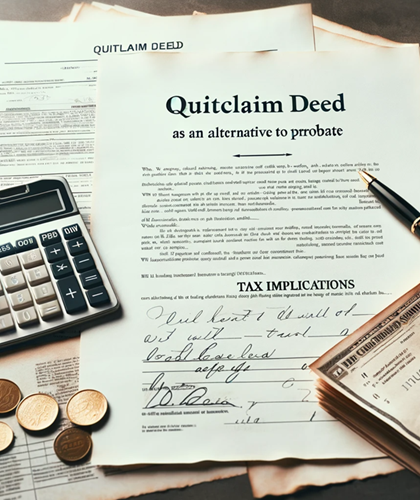
A quitclaim deed conveys—”quits”—a person’s interest in a property to someone else. Quitclaims prove useful in certain transfers of properties among family members or between divorcing spouses. The quitclaim allows separating partners to follow a court’s direction and leave one party as sole owner of the marital home. Quitclaims might seem convenient in other circumstances, but they are rarely the best choice.
In contrast to the warranty deed, a quitclaim deed offers no assurances of clear title. In most jurisdictions a recorder of deeds must simply record a quitclaim deed; it is not the recorder’s role to investigate the circumstances of the conveyance.
Scammers may take advantage of the quitclaim’s simplicity to siphon equity from vulnerable people. After recording a quitclaim, a bad actor may sell the property with no guarantees, rent it under false pretenses, or exploit its underlying value as collateral.
Spot the Mortgage Relief Scam
The quitclaim may be the deed of choice for scammers preying on people struggling to make their mortgage payments, too. There are a number of well-worn tricks. Tricksters scour the public foreclosure notices, find their targets, and then write to specific homeowners. Others advertise more widely, with “Stop foreclosure!” notices. The con artist or fake company might claim to be a “forensic auditor” or a bank. Some scammers say they are affiliated with the government. Many tout a money-back guarantee.
They might have the homeowner sign papers to get a modified loan, supposedly to reduce the monthly mortgage payment. Buried in the middle of the paperwork is an agreement to transfer the title.
Other shady actors tell distressed homeowners outright to quit their interest on the titles and become renters to buy back their homes later, after building better credit. Soon, the residents may face unmanageable rent increases—after placing their homes in a villain’s hands.
Other ploys persuade owners to sign quitclaim deeds, move out, and await a promised portion of the home sale proceeds. Then the manipulators let the home foreclose, while renting it out or otherwise exploiting its value. The duped owners have given away their interests in the real estate—but kept their mortgage debts.
A homeowner who needs a loan modification or other mortgage assistance should call the current mortgage lender directly and ask for options. The government may offer other workable foreclosure relief options.
Note that the Mortgage Assistance Relief Services (MARS) Rule directs mortgage assistance companies to state the client’s total fees up front. The rule bars companies from taking fees before an owner gets an offer from a real lender—and accepts it.
A different standard applies to lawyers. A lawyer offering genuine legal assistance can require a fee up front. The lawyer must be licensed in the homeowner’s state and must deposit the homeowner’s payments in a client trust account. The lawyer may withdraw the client’s money only when completing legal services, and must notify the client of every withdrawal from the trust account. Homeowners should carefully research the credentials of mortgage relief providers that hold themselves out as legal professionals.
Bottom line: legitimate mortgage assistance businesses do not require the homeowner to convey an ownership interest.
Quitclaims Are Not an Alternative to Probate

Many parents hope to transfer a home to their adult children. A quitclaim deed may seem easy. Yet the Internal Revenue Service takes a hard look at parent-to-child property transactions. The IRS imposes a gift tax on real estate with a higher fair market value than the permitted annual exemption. Moreover, a quitclaim giveaway means the child gets the property at the value the parent paid. A beneficiary to the will, in contrast, gets a “stepped up” cost basis—which means relief from ultimately large capital gains taxes.
Some parents have given deeds to children or other relatives to hold “in case something happens to me”—that is, to save and record after the homeowner’s death. Risks abound in this form of casual estate planning.
- Unrecorded deeds disappear. Deeds can get lost or forgotten, or wind up in an adult child’s safe. Parents with good reasons to change their minds later about the gift cannot do so. Passing a deed for someone to hold means giving away choice.
- Undelivered deeds are recipes for confusion. A quitclaim that someone holds onto is an uncompleted gift. The estate must determine if the homeowner met delivery of deed requirements, and satisfied all state law provisions. Thus, the probate court will still face a duty to oversee the home’s disposition—the quitclaim deed itself may have expired when the homeowner did.
- Deeds “to hold” get recorded anyway. On the other hand, the adult child might record the deed before the parent’s death to ensure its validity. Then the parents risk losing the homestead exemption on their taxes. Even if the recipient holds onto the deed, a later attempt to record the deed could subject the property to an unexpected tax bill that will have to be paid or fought in court. This does not even get into possible ramifications for fraud, where homeowners have listed the home as an asset when applying for and claiming benefits—yet have also created an undisclosed deed.
Alternative Estate Planning Options
As for documents that avert probate, consider:
- A Declaration of Trust. The parent can use this document to create the trust, and convey real property into it through a transfer deed.
- A Revocable Living Trust. Directions in a streamlined, “pour-over” will can move property into the trust that the owner did not yet put into it while alive.
- The Transfer on Death Deed. The TOD (transfer on death) deed includes a legal description of the property and designates a named person or persons (and backups, in case of death of the named persons) to receive property upon the owner’s death. In states that allow it in the real estate context, the TOD deed is a simple solution. This revocable deed—signed by the grantor, notarized and recorded—expressly takes effect on death. When beneficiaries present the owner’s death certificate to the county, they receive the property, and become responsible for any debts and obligations on the home.
An unwilling beneficiary is free to refuse a deed.
Every Estate Plan Is Unique
Avoiding probate, while usually desirable, is not essential for everyone. A will containing explicit directions can serve to transfer a home effectively, befitting an overall estate plan. The probate process is both transparent and authoritative, with a court certifying the transfer of title.
Whether through wills, trusts, TOD or other mechanisms, informed and careful planning is the key.
Supporting references:
https://www.consumer.ftc.gov/articles/0100-mortgage-relief-scams
